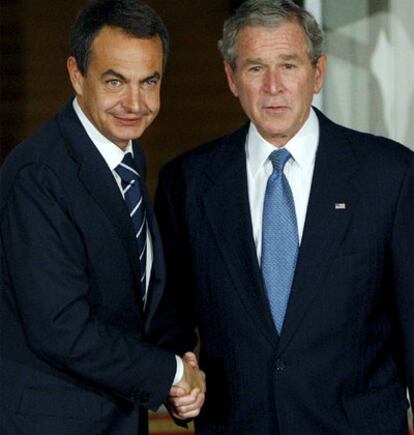How the US tried to stymie Zapatero's Iraq withdrawal plan
Embassy in Madrid: "Spain is immature and he is inexperienced"
José Luis Rodríguez Zapatero and his Socialist Party's (PSOE) assumption of power came as a complete surprise to the United States, to the extent that cable 15124 of the Wikileaks documents that EL PAÍS has had access to was titled "Who are the Spanish Socialists?"
Against the backdrop of Zapatero's election campaign promise to pull troops from Iraq, or what Manuel Chaves, then-PSOE president, termed "Aznar's war," the US Embassy in Madrid initially believed that the incoming prime minister would be easy to bring to heel. "The PSOE is in a state of shock having won the elections and is trying to figure out what to do now," one cable reads.
"Zapatero has no experience either in government or in foreign policy. He will probably be a difficult interlocutor but easy to handle and he will continue the typical skepticism of the Spanish left against the United States. Opposition to the war in Iraq is central to him. However, a resolution giving the UN a larger role in Iraq may allow him to save face and keep Spanish troops in Iraq," continues cable 15123.
"Zapatero will have to work hard to dispel the image that he won because he will placate the terrorists"
The Embassy cables attempted to defuse the wave of criticism of Zapatero's election then sweeping through conservative media in the US, claiming that Al Qaeda had won the Spanish elections, held three days after the March 11 bombings in Madrid, in which 191 people were killed. "Spanish democracy is still very immature - less than 30 years. The high [voting] participation was a victory for Spanish democracy. We should avoid criticism of Spanish voters and leave them to reach their own conclusions about the government they have chosen, despite it being in extraordinary circumstances."
However, the cables take a more sinister turn when dealing with Zapatero's possible foreign policy maneuvers: "Zapatero will have to work hard to dispel the image that he won because he will placate the terrorists (or that he was chosen by Al Qaeda). He will have to calibrate his decisions to avoid the impression that terrorists could influence his foreign policy. We should permit other European leaders to express their concern to Zapatero that he appears to be surrendering to the terrorists."
Little by little, the US Embassy came to realize that it would not be so easy to twist Zapatero's arm. Confidential cable 15233 states that then-Foreign Minister Miguel Ángel Moratinos "said that Zapatero is very worried about criticism from some sectors of the US that say Al Qaeda put the PSOE in power. 'It's a red line that we cannot accept. We will withdraw troops from Iraq unless there is a change in the role of the UN'."
Zapatero surprised the US by acting swiftly. On April 18, 2004, no sooner than he had taken office, Zapatero ordered the withdrawal of Spanish forces from Iraq. The US was furious. Chaves told the ambassador (cable 17644) that "the withdrawal was a political necessity for Zapatero. Aznar's decision to send troops to Iraq was taken against the wishes of the Spanish people. The use of force by the US in Iraq was a mistake. Zapatero's victory was not caused by the Madrid bombings of March 11, but by Aznar's decision to join the war in Iraq."

Tu suscripción se está usando en otro dispositivo
¿Quieres añadir otro usuario a tu suscripción?
Si continúas leyendo en este dispositivo, no se podrá leer en el otro.
FlechaTu suscripción se está usando en otro dispositivo y solo puedes acceder a EL PAÍS desde un dispositivo a la vez.
Si quieres compartir tu cuenta, cambia tu suscripción a la modalidad Premium, así podrás añadir otro usuario. Cada uno accederá con su propia cuenta de email, lo que os permitirá personalizar vuestra experiencia en EL PAÍS.
En el caso de no saber quién está usando tu cuenta, te recomendamos cambiar tu contraseña aquí.
Si decides continuar compartiendo tu cuenta, este mensaje se mostrará en tu dispositivo y en el de la otra persona que está usando tu cuenta de forma indefinida, afectando a tu experiencia de lectura. Puedes consultar aquí los términos y condiciones de la suscripción digital.








































